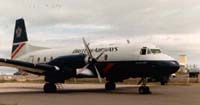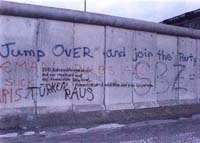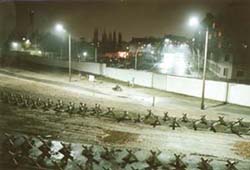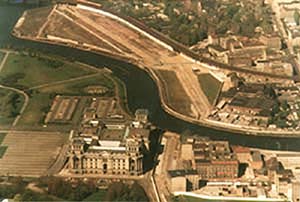HOLE IN THE BERLIN WALL
 It was the beginning of October, already dark with the lengthening nights
signifying the onset of winter, as I found myself in command of an ageing
Hawker Siddeley 748 approaching Hehlingen, a small village in the Bundesrepublik
Deutschland and the name of the entry fix of the Central Air
Corridor to Berlin.
It was the beginning of October, already dark with the lengthening nights
signifying the onset of winter, as I found myself in command of an ageing
Hawker Siddeley 748 approaching Hehlingen, a small village in the Bundesrepublik
Deutschland and the name of the entry fix of the Central Air
Corridor to Berlin.
My lumbering old turbo prop had already been descended to the required
height for the over flight of the German Democratic Republic, fixed by
historical precedent to a figure of below 10,000 feet which, considering
the performance of modern jets, was an altitude hopelessly out of date
in the 1980s. I was aware that, coming up fast, below and behind, was a
Boeing 737 operated by a, would be, new, airline-conglomerate called EuroBerlin.
As there was little to disturb the calm routine of the evening flight from
Münster Greven to Berlin Tegel along a route I had flown a thousand
times or so before, my mind began to ponder the matter of this fledgling
arrival to the Berlin scene. EuroBerlin was technically a French Company
with a complicated equity arrangement whereby, the West German national
airline, Lufthansa, held 49% of the shares. To further confuse the issue,
the aeroplanes were registered in the United Kingdom. They were actually
operated by Monarch, a British company who had wet leased them to the French
parent. Further evidence of the British credentials could be determined
by the accent of the aircraft's pilot, now hot on my tail, whose conversation
with air traffic control I was able to hear on our common radio frequency.
 I was also aware that some one hundred and fifty miles to the east, in
a building adjacent to Kleist Park, PotsdamerStraße, West Berlin,
another routine relating to both our flights would be taking place. The
Berlin Air Safety Centre had been the home of a unique establishment
for over 40 years. The so called BASC, would be processing the impending
arrival of myself and that of my fellow aviator shortly to pass 2000 feet
below, to the over flight of the Soviet Air Defence Identification Zone.
The BASC owed its existence to a treaty signed after the Second World War
giving access of the Western Allies to their respective garrisons in the
former German Capital which, by accident of history, had found itself inside
the Soviet Zone of occupied Germany. A cornerstone of that agreement restricted
the use of three air corridors to aircraft registered in The United States,
The United Kingdom, France (and
Poland). As a consequence, amongst others, the West German Airline,
Lufthansa was barred from operation to a city geographically inside the
GDR. This restriction had remained in effect to that very day by virtue
of The Cold War.
I was also aware that some one hundred and fifty miles to the east, in
a building adjacent to Kleist Park, PotsdamerStraße, West Berlin,
another routine relating to both our flights would be taking place. The
Berlin Air Safety Centre had been the home of a unique establishment
for over 40 years. The so called BASC, would be processing the impending
arrival of myself and that of my fellow aviator shortly to pass 2000 feet
below, to the over flight of the Soviet Air Defence Identification Zone.
The BASC owed its existence to a treaty signed after the Second World War
giving access of the Western Allies to their respective garrisons in the
former German Capital which, by accident of history, had found itself inside
the Soviet Zone of occupied Germany. A cornerstone of that agreement restricted
the use of three air corridors to aircraft registered in The United States,
The United Kingdom, France (and
Poland). As a consequence, amongst others, the West German Airline,
Lufthansa was barred from operation to a city geographically inside the
GDR. This restriction had remained in effect to that very day by virtue
of The Cold War.
In a vast, near empty building, the former home of the NAZI People's
Court, huddled around a table in a wood panelled room, military officers
of Britain, France and the USA laboured with the Russians to ensure compliance
with the accord. For over forty years the Soviets had communicated their
permission to the other three allies for each and every over flight by
passing strips of paper across a table. The allies then telephoned the
permission to personnel at the air traffic control centre located at Tempelhof
 Accord, treaty, agreement or whatever, the Allies had used the air corridors
for many years for purposes other than the supply of their respective garrisons.
Since it was obvious that their use by British, French and American airlines
flying commercial passengers of all nationalities was not strictly in accordance
with the rules, the question of flights by EuroBerlin looked like a different
shade of what was already diplomatic grey. On the day in question, EuroBerlin
had not yet begun operations and the flight of which I was aware was one
of a series taking place in the run up to the first commercial operations
due the following week. Everything depended on the attitude of the Russians.
During the previous week there had been considerable speculation as to
how they might react to this newcomer to the Berlin skies. The signs, however,
were not good for, notwithstanding Glasnost and Perestroika, the Soviet
Foreign Minister had been making unpleasant noises about EuroBerlin breaking
the spirit of the air access agreements, pointing out that, by virtue of
its share allocation and its methods of marketing tickets in West Germany,
the organization was transparently Lufthansa.
Accord, treaty, agreement or whatever, the Allies had used the air corridors
for many years for purposes other than the supply of their respective garrisons.
Since it was obvious that their use by British, French and American airlines
flying commercial passengers of all nationalities was not strictly in accordance
with the rules, the question of flights by EuroBerlin looked like a different
shade of what was already diplomatic grey. On the day in question, EuroBerlin
had not yet begun operations and the flight of which I was aware was one
of a series taking place in the run up to the first commercial operations
due the following week. Everything depended on the attitude of the Russians.
During the previous week there had been considerable speculation as to
how they might react to this newcomer to the Berlin skies. The signs, however,
were not good for, notwithstanding Glasnost and Perestroika, the Soviet
Foreign Minister had been making unpleasant noises about EuroBerlin breaking
the spirit of the air access agreements, pointing out that, by virtue of
its share allocation and its methods of marketing tickets in West Germany,
the organization was transparently Lufthansa.

"EuroBerlin November Bravo, this is Berlin Centre, your corridor
clearance is not authorized. Turn around, I say again, turn around and
proceed out of the centre corridor" I listened and heard in partial
disbelief to the controlling voice beamed from Tempelhof. In that instant
of time I realized that it had happened! -the Russians were finally saying
niet In that moment, I had visions of the scene at the BASC. Hats
would be donned, officers would stand to attention and speeches would be
made. I speculated as to the words of the Russian translator articulating
to the effect that "Agreements were agreements and in spite of Perestroika,
no way was the Union of Soviet Socialist Republic going to allow Lufthansa
in by the back door" Given the importance of the events, I surmised that
the telephone lines to the Quai d'Orsay, Whitehall and Washington would
be simultaneously in action summoning Ambassadors and Air Attaches to their
offices. My mind drifted to thoughts of power struggles within the Kremlin
and the eventual downfall of Gorbachov. After 43 years of Cold War, the
thaw for which we had all yearned and welcomed had come to an end. The
apparatus of which I had become part would continue to play its role beyond
the years of my retirement. "Roger" came the reply with only the
faintest hint of surprise "Could you confirm the reason for the turn
around?" "November Bravo we do not have a flight plan with that call sign.
Could you please confirm you are November Bravo or are you the thirteen
seventy six.?" "Affirm," spoke the British voice, "we must be filed
as the thirteen seventy six" "Okay," came back the voice from deep
in Tempelhof "Cleared to Havel via Centre Route Two. Sorry we misunderstood
the plan"
 It was a few days later that EuroBerlin began operations from West Germany
to West Berlin. A Berlin airlift and forty years of Soviet intervention
had been swept away. The scenario to which I had alluded was, thankfully,
not to be. The significance of the arrival of EuroBerlin attracted little
attention in Great Britain, although I doubt the point was missed at diplomatic
level. I remember thinking that, in accepting the new company, the Russians
had signalled to the Western Allies a crack in the Berlin Wall. That date
was October 1988. Soon after the crack became a hole and on 9th. November
1989, the wall itself began to disappear.
It was a few days later that EuroBerlin began operations from West Germany
to West Berlin. A Berlin airlift and forty years of Soviet intervention
had been swept away. The scenario to which I had alluded was, thankfully,
not to be. The significance of the arrival of EuroBerlin attracted little
attention in Great Britain, although I doubt the point was missed at diplomatic
level. I remember thinking that, in accepting the new company, the Russians
had signalled to the Western Allies a crack in the Berlin Wall. That date
was October 1988. Soon after the crack became a hole and on 9th. November
1989, the wall itself began to disappear.
Return to index page
Photos:
15KB JPEG file Hawker Sidderley HS 748
17KB JPEG file Graffiti on Berlin Wall
21KB JPEG file Berlin Wall and Oderbergerstraße by night
19KB JPEG file Brandenburg Gate from West Berlin
29KB JPEG file Aerial view of The Reichstag and the Berlin Wall
revised 23/02/09
Copyright Christopher Burke all rights reserved
Acknowledgements: Armelle Burke
 I was also aware that some one hundred and fifty miles to the east, in
a building adjacent to Kleist Park, PotsdamerStraße, West Berlin,
another routine relating to both our flights would be taking place. The
Berlin Air Safety Centre had been the home of a unique establishment
for over 40 years. The so called BASC, would be processing the impending
arrival of myself and that of my fellow aviator shortly to pass 2000 feet
below, to the over flight of the Soviet Air Defence Identification Zone.
The BASC owed its existence to a treaty signed after the Second World War
giving access of the Western Allies to their respective garrisons in the
former German Capital which, by accident of history, had found itself inside
the Soviet Zone of occupied Germany. A cornerstone of that agreement restricted
the use of three air corridors to aircraft registered in The United States,
The United Kingdom, France (and
Poland). As a consequence, amongst others, the West German Airline,
Lufthansa was barred from operation to a city geographically inside the
GDR. This restriction had remained in effect to that very day by virtue
of The Cold War.
I was also aware that some one hundred and fifty miles to the east, in
a building adjacent to Kleist Park, PotsdamerStraße, West Berlin,
another routine relating to both our flights would be taking place. The
Berlin Air Safety Centre had been the home of a unique establishment
for over 40 years. The so called BASC, would be processing the impending
arrival of myself and that of my fellow aviator shortly to pass 2000 feet
below, to the over flight of the Soviet Air Defence Identification Zone.
The BASC owed its existence to a treaty signed after the Second World War
giving access of the Western Allies to their respective garrisons in the
former German Capital which, by accident of history, had found itself inside
the Soviet Zone of occupied Germany. A cornerstone of that agreement restricted
the use of three air corridors to aircraft registered in The United States,
The United Kingdom, France (and
Poland). As a consequence, amongst others, the West German Airline,
Lufthansa was barred from operation to a city geographically inside the
GDR. This restriction had remained in effect to that very day by virtue
of The Cold War.
 It was the beginning of October, already dark with the lengthening nights
signifying the onset of winter, as I found myself in command of an ageing
Hawker Siddeley 748 approaching Hehlingen, a small village in the Bundesrepublik
Deutschland and the name of the entry fix of the Central Air
Corridor to Berlin.
It was the beginning of October, already dark with the lengthening nights
signifying the onset of winter, as I found myself in command of an ageing
Hawker Siddeley 748 approaching Hehlingen, a small village in the Bundesrepublik
Deutschland and the name of the entry fix of the Central Air
Corridor to Berlin.


